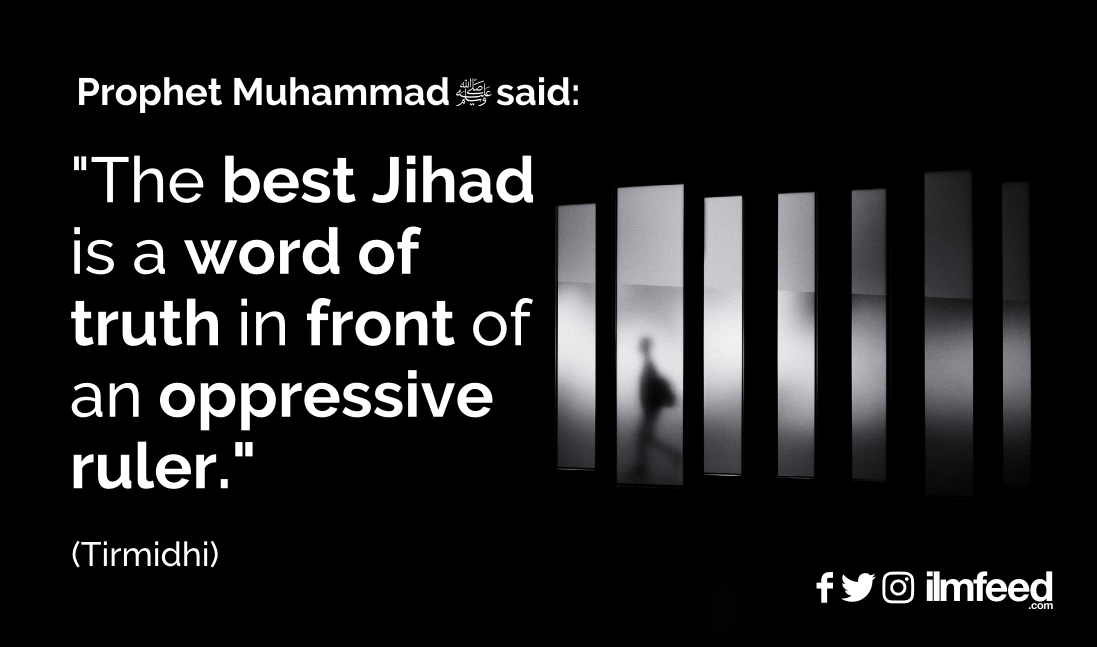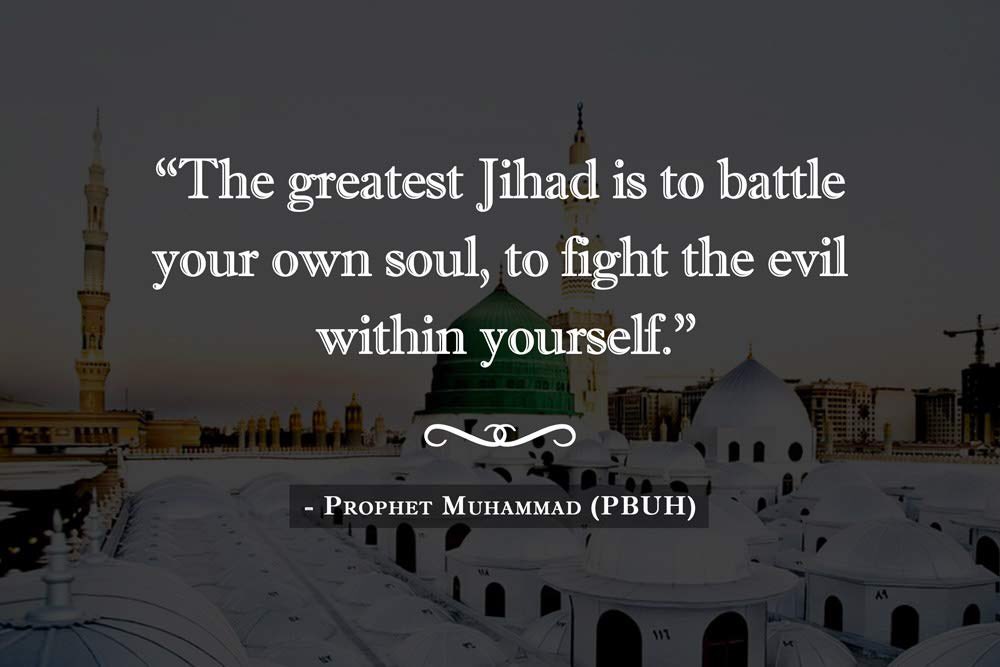
Jihad (Striving)
Abdullah ibn Mas’ud reported: I asked, “O Messenger of Allah, which deed is best?” The Messenger of Allah, peace and blessings be upon him, said, “Prayer in its proper time.” I asked, “What is next?” The Prophet said, “Good treatment of your parents.” I said, “What is next?” The Prophet said, “Jihad in the way of Allah.” I became silent and if I had asked him more, he would have told me.
Source: Bukhārī 2630, Ṣaḥīḥ Muslim 85
The third most important good deed according to the above narration attributed to the prophet of Islam, is Jihad. Jihad means “striving in the way of Allah(ﷺ).
Jihad, unfortunately a commonly misrepresented term is the noble effort of improving oneself, one’s family and community, one’s nation and the world at large. Every Muslim is compelled to continuously strive for betterment and this is called Jihad.

The Arabic word Jihad is derived from the verb Jahada – meaningto strive or struggle. In Islamic terminology it means to make an effort, to endeavour and to strive for a noble cause. The word is generally used to describe any type of striving in the cause of Allah (God). According to Islamic teachings there are three main types of Jihad and they all seek to establish and promote peace in society, as explained below.
Types of Jihad
According to Islamic teachings there are three main categories of Jihad:
(i) Jihad-e-Akbar i.e. jihad of the highest order.
This is the jihad (struggle) for self-reformation. The struggle is against our own temptations such as greed, lust and other worldly temptations. This is a journey of a person from an ‘animalistic’ state of existence i.e. living for immediate gratification or gain to one where his psyche is disciplined enough to exercise moral control. This type of jihad is obligatory on every Muslim throughout his life.
(ii) Jihad-e-Kabir i.e. major jihad.
This is the jihad of propagation of the truth, the message of Qur’an. The Qur’an also instructs us to spread this message with wisdom, tolerance and respect to others and their beliefs,
Call unto the way of thy Lord with wisdom and goodly exhortation…;
Quran 16:126
And revile not those whom they call upon beside Allah, lest they, out of spite, revile Allah in their ignorance. Thus unto every people have We caused their doing to seem fair. Then unto their Lord is their return; and He will inform them of what they used to do.
Quran 6:109
It prohibits the use of any coercion or force,
There should be no compulsion in religion. Surely, right has become distinct from wrong; so whosoever refuses to be led by those who transgress, and believes in Allah, has surely grasped a strong handle which knows no breaking. And Allah is All-Hearing, All-Knowing.
Quran 2:257
According to the Qur’an anyone who devotes his time, effort, wealth or knowledge to the cause of righteousness is practising Jihad-e-Kabir. This is also obligatory on all Muslims.
(iii) Jihad-e-Asghar i.e. jihad of the lower order.
This is the jihad of a defensive battle. The Qur’an has clearly restricted this type of jihad to certain conditions while forbidding transgression of any sort.
1. The battle can only be defensive and not an offensive one.
And fight in the cause of Allah against those who fight against you, but do not transgress. Surely Allah loves not the transgressors.
Quran 2:191
2. Muslims should have faced oppression in the practice of their religion and a threat to their life.
3. Muslims should have been driven out of their homes; the teaching is to initially leave from where the oppression is taking place, and if the oppressor attacks the Muslims to stop them from practice of their religion in the new abode and also threaten their lives, only in these circumstances are the Muslims allowed to take up arms in a defensive battle.
Further on, there are clear directions in what can and cannot be done in a battle fought by the Muslims.
- Civilians who are not fighting against Muslims are not to be attacked or killed at all.
- Crops or other sources of food and water and cattle or other animals are not to be destroyed.
- Hospitals, orphanages and other places of safety and refuge are not to be destroyed.
- Mosques, churches, synagogues or other places of worship are not to be destroyed.
- Women, children, old and disabled are to be left untouched.
- If the aggressor stops the aggression or offers a treaty it should be accepted and the fighting stopped forthwith.
- Fleeing oppressors need not be pursued to any unnecessary length and should be allowed to return to their home.
- Prisoners of War should be treated with respect and their basic needs be fulfilled and they should be freed or ransomed as soon as possible after the battle.
Hence it is very clear that the purpose of any such battle is still to restore peace and not to promote aggression. It is important to note that starting of such a battle is not in the hands of the Muslims but can only be initiated by an oppressor fulfilling the aforementioned conditions.
Source: https://www.alislam.org/question/what-does-jihad-mean/


